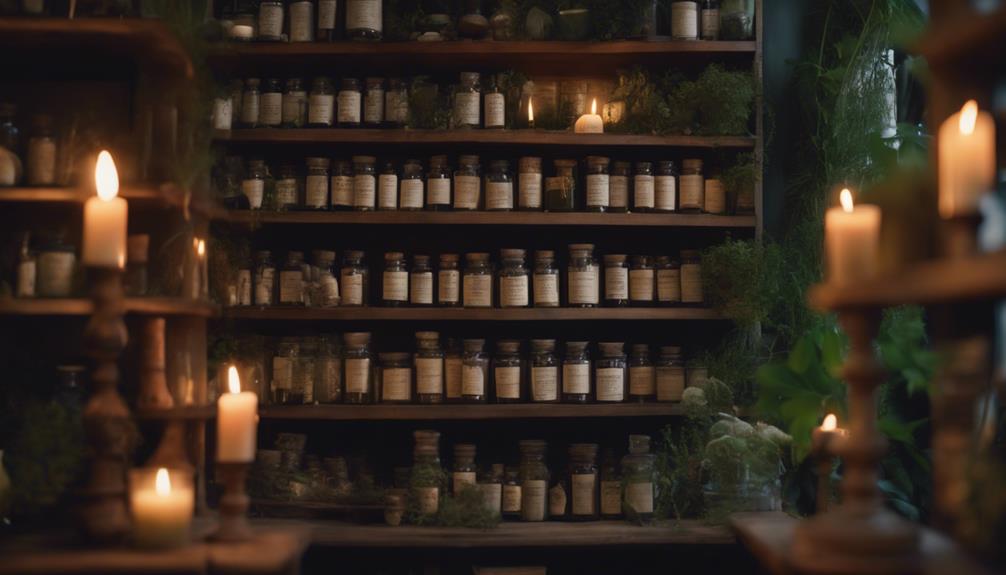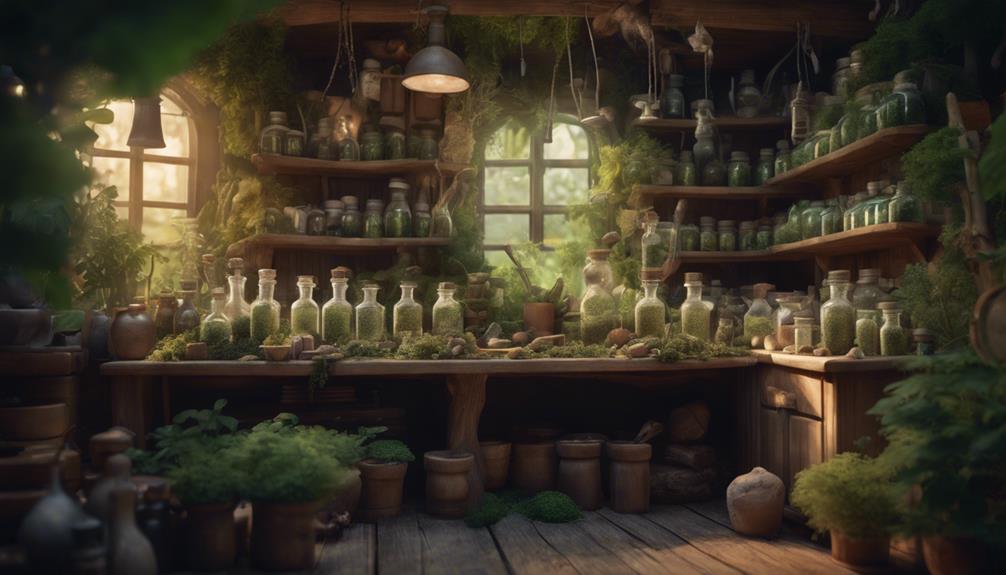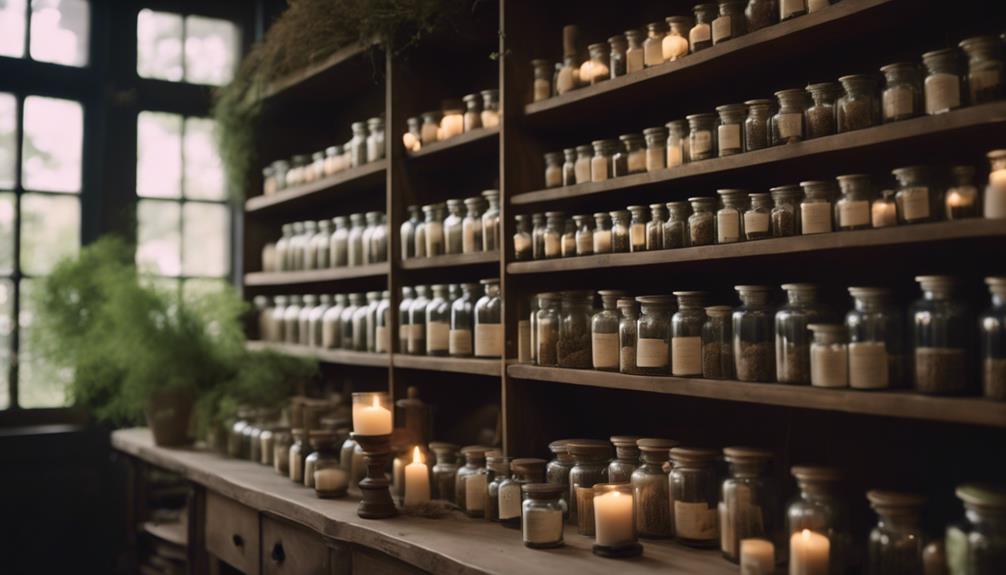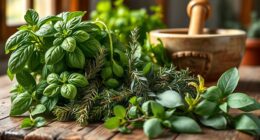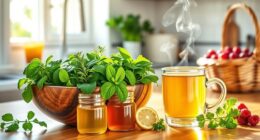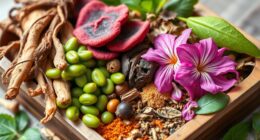As we start on the journey of herbalism, we recognize that essential knowledge encompasses not only the medicinal properties of herbs but also a deep understanding of traditional practices, cultural heritage, and a commitment to environmentally responsible and sustainable practices. We explore the principles of herbalism, traditional practices like Ayurveda and Traditional Chinese Medicine, and the importance of understanding herb properties and applications. We build a foundational library, seek guidance and mentorship, and develop a respect for nature. By continuously learning and growing, we deepen our understanding of herbalism and its many facets, and there's much more to discover as we continue on this path.
Key Takeaways
• Understand the principles of herbalism, recognizing the interconnectedness of body, mind, and spirit for holistic well-being.
• Familiarize yourself with traditional herbal practices, including Ayurveda, Traditional Chinese Medicine, and Western herbalism.
• Learn about herb properties, flavors, and actions to create personalized remedies and understand medicinal potential.
• Build a foundational library with essential herbal texts, covering principles, practices, and applications of herbalism.
• Seek guidance from experienced herbalists, engage in continuous learning, and prioritize respect for nature through sustainable practices.
Understanding Herbalism Principles
As we explore the world of herbalism, we find that its principles are rooted in the ancient wisdom of using plants and herbs to promote health and healing.
At its core, herbalism is a holistic approach to medicine that seeks to nourish the whole person – body, mind, and spirit – through the use of herbs and plants. This approach recognizes the intricate connection between humans and the natural world, and harnesses the power of plants to restore balance and promote well-being.
Herbalism isn't just about treating symptoms; it's about addressing the underlying causes of illness and promoting overall health. By leveraging the therapeutic properties of herbs, herbalism offers a natural and effective way to prevent and treat various health conditions.
As we explore further into the world of herbalism, we'll discover the vast array of plants and herbs that have been used for centuries to create medicine, and investigate the principles that guide this ancient practice.
Traditional Practices and Cultures

We explore the rich tapestry of traditional practices and cultures, where the wisdom of herbalism has been woven into the fabric of diverse societies worldwide. As we investigate the world of herbalism, we find that traditional practices are rooted in the cultural heritage of various societies. These practices have been passed down through generations, adapting to local plants and traditions, and shaping the unique characteristics of each cultural approach to herbalism.
Some examples of traditional practices include:
- Ayurveda, which originated in ancient India and emphasizes the interconnectedness of body, mind, and spirit.
- Traditional Chinese Medicine, which views the body as a delicate balance of yin and yang energies.
- Western herbalism, which draws on European folk medicine and emphasizes the use of local plants for healing.
These traditional practices share a common goal: to nourish the whole person and promote holistic well-being through herbal healing. By understanding and respecting these diverse approaches, we can gain a deeper appreciation for the richness and complexity of herbalism.
Herb Properties and Applications

Frequently, we find that understanding the properties of herbs is essential to harnessing their medicinal potential. In the domain of herbal medicine, medicinal herbs are valued for their unique properties, which can be categorized into flavors, actions, and medicinal qualities. These properties determine how herbs interact with the body, and knowledge of them is vital for effective treatment.
For instance, some herbs possess anti-inflammatory or antimicrobial effects, while others have calming or stimulating properties. As herbalists, we match these properties to individual health needs, creating personalized remedies for various health conditions.
In terms of herb applications, we can use herbs in teas, tinctures, salves, or even culinary dishes to reap their health benefits. Learning about herb applications enables us to create targeted remedies that address specific health concerns.
Building a Foundational Library

As we build a foundational library for herbalism, we need to take into account the essential texts that will serve as the backbone of our collection.
We'll want to focus on acquiring key herbal texts that cover the fundamentals, and then thoughtfully curate our shelves to make sure we've a thorough and organized resource.
From there, we can start to explore the nuances of herbalism, confident that our foundational library provides a solid starting point.
Herbal Texts to Own
When building a foundational library for herbalism, we turn to trusted texts that provide a solid understanding of the craft, and the following titles are essential additions to any herbalist's bookshelf.
To establish a well-rounded collection, we recommend including texts that offer practical guidance and a thorough overview of herbalism.
Here are three essential herbal texts to own:
- 'Rosemary Gladstar's Medicinal Herbs: A Beginner's Guide': A beginner's guide that provides practical guidance for those new to herbalism.
- 'The Modern Herbal Dispensatory: A Medicine-Making Guide': A valuable medicine-making guide that focuses on herbal medicine preparation.
- 'Medical Herbalism: The Science and Practice of Herbal Medicine': A resource that provides in-depth knowledge on the science behind herbalism.
These texts, along with others, provide a solid foundation for understanding the principles and practices of herbalism. They offer a mix of theoretical knowledge and practical application, making them indispensable for any herbalist.
Building a Collection
We start building our foundational library with essential texts that provide a solid understanding of herbalism. As beginners, we need a reliable guide to introduce us to the world of herbs. That's why we include reference guides like 'Rosemary Gladstar's Medicinal Herbs: A Beginner's Guide' in our collection. This detailed guide provides practical knowledge on herbalism, making it an excellent resource for us.
To expand our understanding, we add books on herbal actions, plant identification, and herbal remedy recipes. These texts help us grasp the complexities of herbalism and develop our skills.
Beyond books, we explore online resources like the American Herbalist Guild and Herbal Academy, which offer valuable information and insights from experienced herbalists. We also join local herbalism groups or attend workshops to further enhance our knowledge and collection.
Organizing Your Shelf
We curate our foundational library by prioritizing essential texts that provide a thorough understanding of herbalism. Our shelves are organized with books that offer a detailed grasp of herbalism, enabling us to explore further into the world of plants and their medicinal properties.
When organizing our shelf, we prioritize the following essential guides:
- Reference books: Like 'The Herbal Medicine-Maker's Handbook' by James Green, which provides a thorough understanding of herbal medicine making.
- Plant identification books: Such as 'Botany in a Day' by Thomas Elpel, which helps us identify plants and enhance our herbalism knowledge.
- Herbal remedy recipe books: Like 'Alchemy of Herbs: Transform Everyday Ingredients into Foods and Remedies That Heal' by Rosalee de la Forêt, which offers practical applications of herbal remedies.
Seeking Guidance and Mentorship

Seeking guidance from experienced herbalists can greatly shorten our learning curve, providing valuable insights and practical knowledge that might take years to acquire on our own. In the domain of herbalism, mentorship plays a crucial role in shaping our skills and understanding of plant medicine.
Many of us benefit from apprenticing with masters to gain hands-on experience and expertise in the field. By working closely with a mentor, we can receive personalized guidance, support, and feedback tailored to our learning needs and goals. This mentor-mentee relationship can lead to a deeper understanding of plant properties, herbal preparations, and holistic healing practices.
Through mentorship, we can navigate the complexities of plant medicine more effectively, developing our skills and confidence in the process. By seeking guidance and mentorship, we can accelerate our growth as herbalists, ensuring that our journey in herbalism is informed, effective, and fulfilling.
Developing a Respect for Nature

One of the most critical aspects of herbalism is recognizing the intricate web of relationships between humans, plants, and the natural world, and honoring the sacred bond between them. As herbalists, we understand that nature provides us with the wisdom and healing power that we harness in our practice. We recognize the interconnectedness of nature and herbal medicine, and we respect the intricate balance of the ecosystem.
Developing a respect for nature involves more than just appreciating its beauty; it requires a deep understanding of our impact on the environment. As we cultivate a deeper appreciation for the natural world, we must also adopt sustainable practices and ethical harvesting of plants.
This includes:
- Sustainable harvesting: avoiding over-harvesting and ensuring that our methods don't harm the environment.
- Responsible sourcing: choosing suppliers who prioritize environmental stewardship and fair labor practices.
- Conscious consumption: using herbal medicine responsibly and minimizing waste.
Continuous Learning and Growth

As we deepen our respect for nature, we're compelled to continue learning and growing, recognizing that herbalism is a lifelong journey that requires us to stay curious and adaptable.
Acknowledging that learning about herbalism is an ongoing process, we're committed to expanding our knowledge base. We can do this by engaging in formal training, workshops, and online courses, which provide valuable opportunities to learn from experienced practitioners.
Joining herbalism communities and networking with other practitioners also offers a wealth of knowledge and experience to draw upon. It's our belief that reading books, journals, and articles on herbalism is essential to deepen our understanding and expertise in the field. For instance, reading 'Herbs: A Beginners' guide can provide a solid foundation for those new to herbalism.
As we experiment with different herbs, formulations, and techniques, we're constantly refining our skills and developing new ones. By embracing continuous learning and growth, we can stay up-to-date on the latest research, trends, and practices, ensuring our knowledge and skills remain current and effective.
Frequently Asked Questions
What Does an Herbalist Need to Know?
As herbalists, we need to know a lot to practice effectively. We must understand the medicinal properties and uses of various herbs and plants, as well as their interactions and contraindications.
We need to be skilled in preparing remedies like tinctures, teas, and salves, and we must adopt sustainable harvesting practices to guarantee the longevity of plant populations.
Staying updated on the latest research in herbal medicine is also essential for our practice.
What Skills Do You Need to Be a Herbalist?
As we pursue a career in herbalism, we need to develop specific skills to excel in this field. We require strong observation skills to identify plants and their properties accurately.
Additionally, we need analytical thinking to understand the effects of herbs on the body. Being nature-focused and intelligent also helps, as we work closely with plants and need to grasp complex botanical knowledge.
How to Gain Knowledge in Herbalism?
We're aware of the importance of gaining knowledge about herbalism, and we're enthusiastic to learn more.
To get started, we'll enroll in formal education programs at accredited institutions. We'll also attend workshops, seminars, and conferences to expand our knowledge base.
Additionally, we'll seek mentorship from experienced herbalists and utilize online resources like webinars, podcasts, and forums.
How Do I Start Learning About Herbalism?
As we set off on this journey, let's start by envisioning a lush garden, teeming with life and possibility.
To begin learning about herbalism, we'll first explore the fundamentals of botany and plant identification.
We'll investigate the rich history of herbalism, discovering traditions like Ayurveda and Traditional Chinese Medicine.
Then, we'll seek out courses, workshops, and mentors to guide us, documenting our experiences and observations along the way.
Conclusion
As we explore the world of herbalism, it's surprising how much we still have to discover. The more we uncover, the more we realize how little we understand. Yet, it's in embracing this paradox that we can truly grow.
By recognizing the complexities of herbalism and acknowledging our own limitations, we can begin to build a solid foundation for our practice. It's a lifelong journey, and one that requires dedication, curiosity, and a willingness to adapt.



